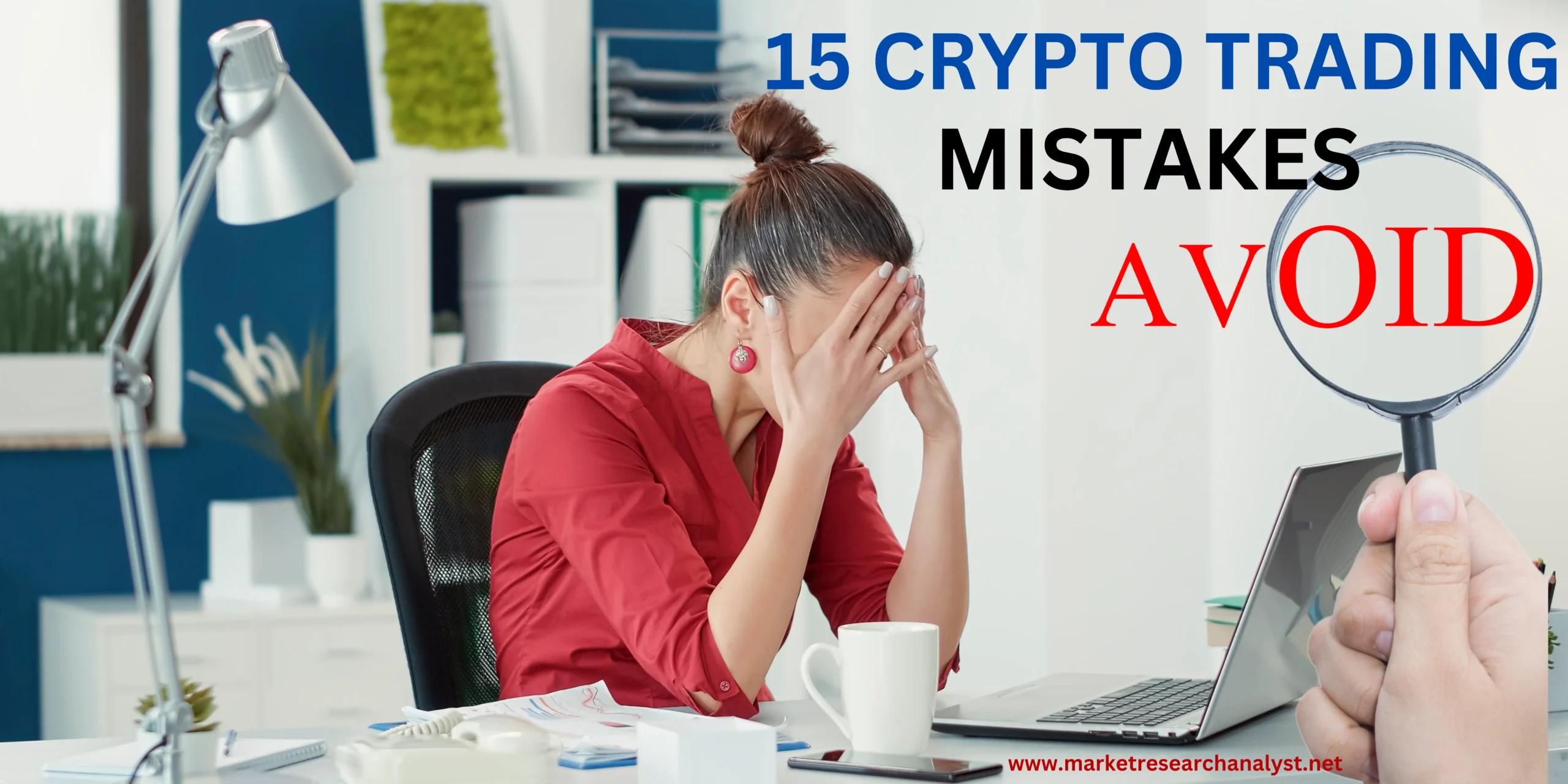Discover 15 essential things to avoid before starting crypto trading to ensure success and minimize risks. Learn how to conduct research, manage risks, avoid scams, and more with our comprehensive guide for new traders. Stay informed and protect your investments with expert advice.

Crypto trading has captured the imagination of investors worldwide, offering the potential for substantial profits and the excitement of navigating a fast-paced, innovative market. However, the allure of high returns comes with significant risks. Before diving into the world of cryptocurrency trading, it’s crucial to be well-prepared and informed. This guide will walk you through 15 key pitfalls to avoid before you start trading crypto. By understanding these common mistakes and how to sidestep them, you can enhance your chances of success, protect your investments, and trade with confidence. Whether you’re a beginner or looking to refine your trading strategy, these insights will help you navigate the volatile and complex world of cryptocurrency with greater ease and security.
Table of Contents

1. Lack of Research
One of the biggest mistakes new traders make is diving into the market without doing adequate research. Research is crucial for understanding how the market works, the various cryptocurrencies available, and the factors that influence their prices. Make sure to study market trends, read whitepapers, and stay informed about the latest news in the crypto world.
2. Ignoring Risk Management
Risk management is essential in trading, especially in the highly volatile crypto market. Avoid trading without a risk management plan. This includes setting stop-loss orders to limit potential losses, determining how much of your portfolio to risk on a single trade, and diversifying your investments to spread risk.
3. Emotional Trading
Trading based on emotions such as fear, greed, or excitement can lead to poor decision-making. Emotional trading often results in buying high and selling low, which is the opposite of a successful strategy. Stay calm and stick to your trading plan, even when the market is volatile.
4. Overleveraging
Leverage allows traders to borrow funds to increase their trading position, but it also amplifies risk. Avoid overleveraging your trades, especially if you’re new to crypto trading. High leverage can lead to significant losses if the market moves against you.
5. Following the Crowd
Just because everyone is talking about a particular cryptocurrency doesn’t mean it’s a good investment. Avoid following the crowd without doing your own analysis. Popularity can drive prices up temporarily, but it doesn’t always reflect the true value of the asset.
6. Neglecting Security
Crypto assets are digital and require strong security measures. Avoid neglecting security practices such as using weak passwords, not enabling two-factor authentication, and storing assets on exchanges instead of secure wallets. Hackers frequently target crypto traders, so it’s crucial to protect your investments.
7. Investing More Than You Can Afford to Lose
Crypto trading can be very volatile, with prices fluctuating dramatically in a short period. Avoid investing more money than you can afford to lose. It’s important to start with an amount that won’t financially cripple you if the market takes a downturn.
8. Lack of a Clear Strategy
Trading without a clear strategy is like sailing without a map. Avoid entering trades without a well-defined strategy. Decide on your entry and exit points, risk tolerance, and profit targets before you start trading. A clear plan helps in making rational decisions and staying focused.
9. Neglecting Market Analysis
Relying solely on gut feelings or tips from others is not a sustainable trading approach. Avoid neglecting market analysis. Use technical analysis, fundamental analysis, or a combination of both to make informed trading decisions. Understanding market patterns and indicators can provide valuable insights into potential price movements.
10. Impatience
Crypto trading requires patience and discipline. Avoid being impatient and making hasty decisions. Sometimes the best action is to wait for the right opportunity rather than forcing a trade. Patience can help you avoid unnecessary risks and increase your chances of success.
11. Ignoring Fees and Taxes
Trading comes with costs, including transaction fees and taxes. Avoid ignoring these costs, as they can eat into your profits. Be aware of the fees charged by exchanges and the tax implications of your trades. Properly accounting for these costs is essential for accurate profit calculation.
12. Falling for Scams
The crypto world is rife with scams, including phishing attacks, Ponzi schemes, and fake ICOs (Initial Coin Offerings). Avoid falling for scams by thoroughly vetting any investment opportunities and only using reputable exchanges and services. If something sounds too good to be true, it probably is.
13. Neglecting Continuous Learning
The crypto market is constantly evolving, with new technologies, regulations, and trends emerging regularly. Avoid neglecting continuous learning. Stay updated with the latest developments, participate in educational forums, and continuously refine your trading strategies.
14. Overtrading
Trading too frequently, or overtrading, can lead to significant losses due to transaction fees and poor decision-making. Avoid overtrading by sticking to your strategy and only making trades when they meet your criteria. Quality over quantity is a good mantra to follow in trading.
15. Ignoring Legal and Regulatory Issues
Crypto trading is subject to legal and regulatory frameworks that vary by country. Avoid ignoring legal and regulatory issues by understanding the laws that apply to crypto trading in your jurisdiction. This includes complying with anti-money laundering (AML) regulations, tax laws, and any other legal requirements.

Conclusion
Crypto trading offers exciting opportunities but comes with its own set of challenges. By avoiding these common pitfalls, you can enhance your trading experience and increase your chances of success. Always do your research, manage your risks, keep your emotions in check, and stay informed about the latest market developments. Remember, the key to successful trading is not just making profitable trades but also protecting yourself from unnecessary losses.
FAQs
Q1: What resources can I use for crypto research?
A: You can use websites like CoinMarketCap, CoinGecko, and crypto news sites like CoinDesk and CryptoSlate. Whitepapers and social media channels like Twitter and Reddit are also valuable resources.
Q2: How do I set up a risk management plan?
A: Determine your risk tolerance, set stop-loss and take-profit levels for each trade, and never invest more than you can afford to lose.
Q3: How can I control my emotions while trading?
A: Develop a trading plan, set clear goals, take regular breaks, and practice mindfulness or meditation to stay calm.
Q4: What is a safe leverage ratio for beginners?
A: Beginners should start with low leverage, such as 2:1 or 3:1, to minimize risk while learning.
Q5: How do I conduct my own analysis?
A: Learn to read charts, understand technical indicators, and keep up with fundamental news affecting the cryptocurrency.
Q6: What are some basic security measures I should follow?
A: Use strong, unique passwords, enable two-factor authentication (2FA), and store your crypto in a hardware wallet.
Q7: How much should I start with when trading crypto?
A: Start with a small amount that you are comfortable losing, and gradually increase your investment as you gain experience.
Q8: What should a trading strategy include?
A: A trading strategy should include entry and exit points, stop-loss levels, risk management rules, and profit targets.
Q9: What are the main types of market analysis?
A: The main types are technical analysis, which focuses on price charts and indicators, and fundamental analysis, which examines the underlying factors affecting a cryptocurrency’s value.
Q10: How can I develop patience in trading?
A: Stick to your trading plan, avoid overtrading, and remember that opportunities will always arise in the market.
Q11: How do I calculate the fees and taxes on my trades?
A: Check the fee structure of your exchange and consult a tax professional to understand the tax obligations in your jurisdiction.
Q12: How can I identify and avoid crypto scams?
A: Be wary of unsolicited offers, verify the credibility of projects, use trusted exchanges, and never share your private keys.
Q13: Where can I continue learning about crypto trading?
A: Follow reputable crypto news sites, join online forums, take online courses, and read books on trading and blockchain technology.
Q14: How can I avoid overtrading?
A: Set clear trading rules, keep a trading journal, and evaluate the quality of each trade instead of focusing on the quantity.
Q15: How can I stay compliant with crypto regulations?
A: Stay informed about the laws in your country, consult with legal experts, and ensure you follow best practices for AML and KYC (Know Your Customer) requirements.

